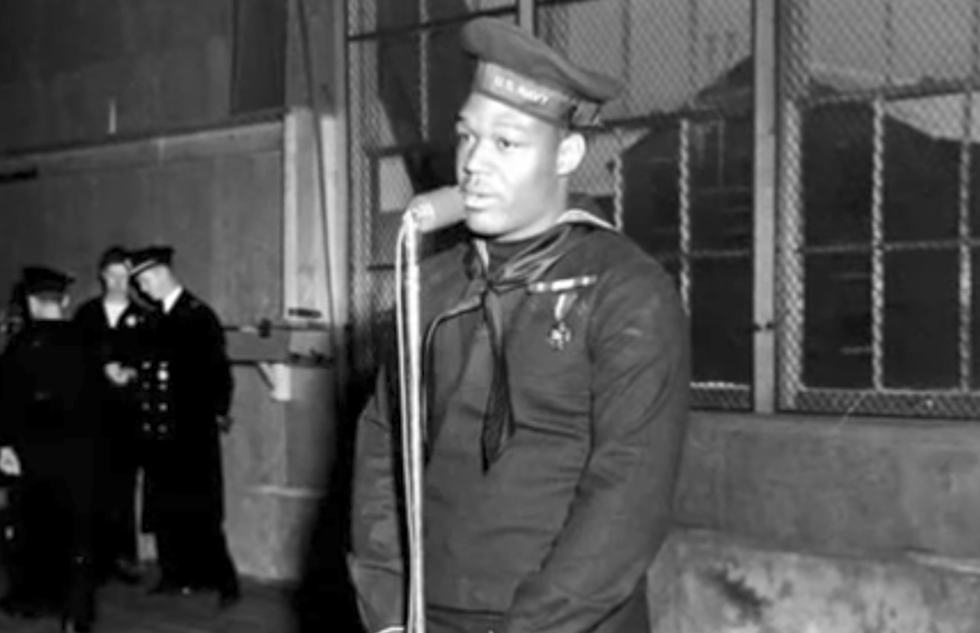
Doris Miller was a Navy Mess Attendant who was awarded the Navy Cross for his heroism during the attack on Pearl Harbor. (Image source: YouTube video screenshot)

This Memorial Day, TheBlaze remembers one particular soldier who gave his life in the service of his country who you may not have heard of. We also honor all our brave troops who gave the ultimate sacrifice for our freedom.
He joined the Navy as a Mess Attendant, because in the 1930s, blacks weren't allowed to be much else. When he was honored for his bravery during the Japanese attack on Pearl Harbor, the Navy didn't even bother to name him in the press release.
Doris Miller didn't come from much, never had much, and the odds were against him ever accomplishing much. But when duty called, the "Negro Messboy" proved himself to be a hero worthy of being named among the greatest men in our nation's history.
Miller was born in Waco, Texas, to parents who named him Doris because the midwife was sure before he was born that he'd be a girl.
He worked on the family farm, progressing slowly through school before eventually dropping out as a 17-year-old eighth grader. A little more than a year after he dropped out, after having been rejected by the Civilian Conservation Corps., Miller enlisted in the Navy just a few weeks after the start of World War II in Sept. 1939.
Miller was assigned to the USS West Virginia in Jan. 1940 performing duties that brought no glory. He served meals and did laundry. And that's what he was doing on a Sunday morning in early December, when the world changed.
At about 7:57 a.m on Dec. 7, 1941, a torpedo hit the West Virginia. It would be only the first of nine Japanese torpedoes to hit the ship. Miller rushed to his battle station, an anti-aircraft battery magazine, but it had been destroyed.
Miller made his way to a central part of the ship and was tasked with transporting the captain, who had been badly injured by shrapnel, to safety. As the ship's boxing champion standing at 6-foot 3-inches and nearly 200 pounds, Miller was considered an ideal person to carry the wounded to safety.
Once the captain was safe, Miller was ordered to load one of the .50 caliber anti-aircraft guns still intact on the ship. Miller complied, but he didn't stop there. Despite having no training on the gun, Miller stepped up in the heat of battle and manned the gun, firing on Japanese aircraft until he was out of ammunition.
From Naval History and Heritage Command:
Miller described firing the machine gun during the battle, a weapon which he had not been trained to operate: "It wasn't hard. I just pulled the trigger and she worked fine. I had watched the others with these guns. I guess I fired her for about fifteen minutes. I think I got one of those [Japanese] planes. They were diving pretty close to us."
Even as the ship continued to get battered by enemy fire, Miller continued transporting the wounded to safety for the duration of the attack. The sailors on board were able to prevent the ship from capsizing, but it eventually sank after Miller and some of the crew made it off.
The Mess Attendant who saved lives and battled Japanese aircraft was recognized and honored across the nation as a hero. He received the prestigious Navy Cross medal in 1942, as well as a Purple Heart. Numerous schools and streets bear his name, and statues carry his likeness.
It took months of inquiry by reporters to figure out exactly who the unnamed negro hero was who fought valiantly during the Pearl Harbor attack. The Pittsburgh Courier was the first to report his identity. The story ran in the paper right next to a story about a jury probing a lynching in Missouri -- a testament to the hostile era in which Miller made his mark.
He died while serving as a cook on the Liscome Bay in the Pacific theater in Nov. 1943 after a Japanese torpedo struck the ship and detonated an aircraft bomb magazine.
Doris Miller's life wasn't fair. He didn't get the opportunities he deserved. He didn't get a chance to fulfill his potential. Even at the peak of his life, some felt his name wasn't even worth the ink it would take to print it because of his race.
But, in one of the darkest moments in our nation's history, Miller transcended all of that, and rose to the occasion in a way that saved lives and helped to alter history. And this Memorial Day, we remember and honor him as a hero.